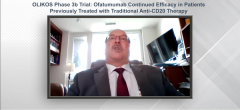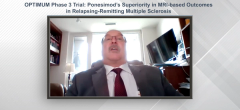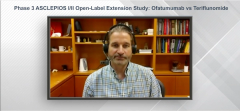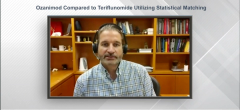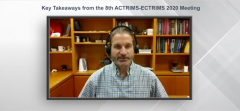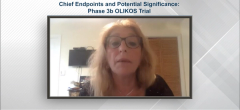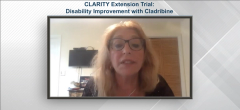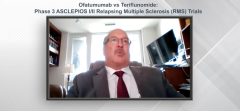
Ofatumumab vs Teriflunomide: ASCLEPIOS I/II RMS Trials
Episodes in this series

An expert discusses data for ofatumumab, the first self-administered anti-CD20 monoclonal antibody, in treatment-naïve patients with early relapsing multiple sclerosis in the phase 3 ASCLEPIOS I/II trials, and the advantage ofatumumab has over other anti-CD20 monoclonal antibody therapies.
Mark Freedman, MD, MSc: The first study I’d like to talk about is entitled, “Benefit-risk of ofatumumab in treatment-naïve early relapsing multiple sclerosis patients.” This is obviously a post-hoc analysis of the large, combined ASCLEPIOS I and II trials of ofatumumab versus teriflunomide in relapsing MS [multiple sclerosis]. One of the questions that comes out of a study like this is about subgroup analyses, which were never predetermined to be looked at in the primary outcome but are nevertheless of interest. Could it be that ofatumumab is useful in patients who have just been diagnosed with MS or have not received any prior therapies whatsoever? Is there anything peculiar about this group? People think that they might be a bit more active compared with the other groups, or that they may have some adverse effect or safety issues that other groups do not have. It was worthwhile to look at, and I mention the caveat that any post-hoc analysis is not proof. If the effect of ofatumumab is lost in a group like this, one would wonder whether there would be some benefit in a larger study if there were more of these patients. You’re looking for the loss of a signal, rather than the game. When one looks at this group and compares the baseline characteristics of these patients to the group as a whole, you want to make sure that they are not standing out, other than the fact that they might have disease a bit earlier. Otherwise, they are similar, and that’s the case.
Compared to teriflunomide, which was the active comparator arm of this study, ofatumumab had a similar effect by reducing relapse rate about 50%. Three-month confirmed disability worsened by 38%. That was barely statistically significant. In fact, it was probably just out of the range of statistical significance. The 6-month risk was barely in the range at 46% with a P value of .044. I’m keeping this in mind. This is a subgroup analysis not powered to see these differences. When you have a lot of events, as on MRI, not surprisingly, there was a strong effect of reducing Gad [gadolinium]-enhancing lesions and new T2 lesions. What is of interest is whether there was an undue safety signal in this group, and so far, there was not. The serious adverse events were reported in similar percentages in both the treated with ofatumumab and teriflunomide groups. There weren’t any malignancies or any increase in infection rate.
In conclusion, the ofatumumab, which is the first self-administered form of anti-CD20 antibodies, showed a continued superiority to teriflunomide in the subgroup of newly diagnosed and treatment-naïve patients. It lowered relapse rates and MRI activity, and there was some borderline significance in time to confirmed disability worsening.
One of the questions is, why bother doing this type of subset analysis? I’m in Canada. Right now, we are awaiting approval of ofatumumab. It is not yet approved in Canada. It is approved in the United States, I believe as a first-line therapy for treatment of multiple sclerosis. We’re not sure how that’s going to read out in Canada. Nevertheless, if it’s a first-line therapy, you want to know that the efficacy is substantiated in a group of newly diagnosed or treatment-naïve patients who would probably be taking it first line. It would seem rather intuitive that it would be, but the analysis needed to be done. That’s why this study was presented.
We’re talking about the advantage of ofatumumab anyway over the other anti-CD20 therapies, which require visitation to an infusion center. People are worried about going anywhere these days with the potential of contracting COVID-19 [coronavirus disease 2019]. It is an advantage to be able to inject yourself, although you’re injecting more often than you would with the traditional anti-CD20 antibodies, which are infused every 6 months. The advantage is that you do not have to venture out to have these done at various centers or hospitals.
Newsletter
Keep your finger on the pulse of neurology—subscribe to NeurologyLive for expert interviews, new data, and breakthrough treatment updates.

